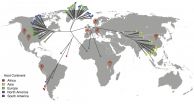(Press-News.org) PHOENIX -- A multicenter study involving Mayo Clinic researchers has found that the National Cancer Institute's Patient Reported Outcomes version of the Common Terminology Criteria for Adverse Events (PRO-CTCAE), was accurate, reliable and responsive, compared to other, established patient-reported and clinical measures. The study is published today in the journal JAMA Oncology.
"In most cancer clinical trials, information on side effects is collected by providers who have limited time with their patients and current patient questionnaires are limited in scope and depth," says the study's lead author Amylou Dueck, Ph.D., a biostatistician on Mayo Clinic's Arizona campus. PRO-CTCAE is a library of items for patients to directly report on the level of each of their symptoms, to enhance the reporting of side effects in cancer clinical trials which is normally based on information from providers. The study itself is unprecedented as more than 100 distinct questions about symptomatic adverse events were validated simultaneously."
Researchers recruited more than 1,000 patients from nine clinical practices across the U.S., including seven cancer centers. These patients reflected the geographic, ethnic, racial and economic diversity in cancer clinical trials. Patients in the study also had a wide range of cancer types.
Patients were asked to fill out the PRO-CTCAE questionnaire before appointments. Researchers then compared the patient reports against other established measures of symptoms, including case and quality of life reports, and prescription information.
Researchers were able to validate 119 of 124 PRO-CTCAE questions against established measurement tools. The five questions that were not validated could not be evaluated due to underrepresentation in the study population.
"This is a landmark study demonstrating that meaningful information about adverse events can be elicited from patients themselves, which is a major step for advancing the patient-centeredness of clinical trials," says the study's senior author, Ethan Basch, M.D., of Memorial Sloan Kettering Cancer Center and the Lineberger Cancer Center of the University of North Carolina.
PRO-CTCAE is now embedded in a number of clinical trials underway.
INFORMATION:
The study was funded by contracts from the National Cancer Institute.
Co-authors include:
Tito R. Mendoza, Ph.D., Department of Symptom Research, University of Texas MD Anderson Cancer Center
Sandra A. Mitchell, Ph.D., CRNP, AOCN, Division of Cancer Control and Population Sciences, National Cancer Institute
Bryce B. Reeve, Ph.D., UNC Lineberger Cancer Center
Kathleen M. Castro, RN, M.S., AOCN, Division of Cancer Control and Population Sciences, National Cancer Institute
Lauren J. Rogak, M.A., Department of Epidemiology and Biostatistics, Memorial Sloan Kettering Cancer Center
Thomas M. Atkinson, Ph.D., Department of Psychiatry and Behavioral Sciences, Memorial Sloan Kettering Cancer Center
Antonia V. Bennett, Ph.D., UNC Lineberger Cancer Center
Andrea M. Denicoff, M.S., RN, ANP, Division of Cancer Treatment and Diagnosis, National Cancer Institute
Ann M. O'Mara, Ph.D., RN, FAAN, Division of Cancer Prevention, National Cancer Institute
Yuelin Li, Ph.D., Department of Psychiatry and Behavioral Sciences, Memorial Sloan Kettering Cancer Center
Steven B. Clauser, M.P.A., Ph.D., Division of Cancer Control and Population Sciences, National Cancer Institute
Donna M. Bryant, M.S.N., ANP-BC, OCN, CCRC, Department of Clinical Research, Cancer Program, Mary Bird Perkins Our Lady of the Lake Cancer Center
James D. Bearden III, M.D., FACP, Gibbs Cancer Center & Research Institute
Theresa A. Gillis, M.D., Helen F. Graham Cancer Center & Research Institute, Christiana Care Health System
Jay K. Harness, M.D., Center for Cancer Prevention and Treatment, St. Joseph Hospital of Orange
Robert D. Siegel, M.D., FACP, Helen & Harry Gray Cancer Center, Hartford Hospital
Diane B. Paul, AAS, a patient advocate and cancer survivor
Charles S. Cleeland, Ph.D., Department of Symptom Research, University of Texas MD Anderson Cancer Center
Deborah Schrag, M.D., M.P.H., Division of Population Sciences, Dana-Farber Cancer Institute
Jeff A. Sloan, Ph.D., Department of Health Sciences Research, Mayo Clinic
Amy P. Abernethy, M.D., Ph.D., Department of Medicine, Duke University Medical Center
Deborah W. Bruner, RN, Ph.D., FAAN, Nell Hodgson Woodruff School of Nursing, Emory University
Lori M. Minasian, M.D., FACP, Division of Cancer Treatment and Diagnosis, National Cancer Institute
About Mayo Clinic Cancer Center
As a leading institution funded by the National Cancer Institute, Mayo Clinic Cancer Center conducts basic, clinical and population science research, translating discoveries into improved methods for prevention, diagnosis, prognosis and therapy. For information on cancer clinical trials, call 1-855-776-0015 (toll-free).
About Mayo Clinic
Mayo Clinic is a nonprofit organization committed to medical research and education, and providing expert, whole-person care to everyone who needs healing. For more information, visit http://mayocl.in/1ohJTMS or http://newsnetwork.mayoclinic.org/.
MEDIA CONTACT:
Jim McVeigh, Mayo Clinic Public Affairs, 507-284-5005, newsbureau@mayo.edu
Early humans were the dominant cause of the extinction of a variety of species of giant beasts, new research has revealed.
Scientists at the universities of Exeter and Cambridge claim their research settles a prolonged debate over whether mankind or climate change was the dominant cause of the demise of massive creatures in the time of the sabretooth tiger, the woolly mammoth, the woolly rhino and the giant armadillo.
Known collectively as megafauna, most of the largest mammals ever to roam the earth were wiped out over the last 80,000 years, and were all extinct by ...
The discovery of antidepressant drugs in the 1950s led to the first biochemical hypothesis of depression, known as the monoamine hypothesis. This hypothesis proposes that an imbalance of certain brain chemicals is the key cause of depression. Research has investigated whether and to what degree the "reward and pleasure" chemical dopamine and, more recently, the "happiness" chemical serotonin, could be the neurotransmitters involved in the malady. However, the monoamine hypothesis does not seem to fully explain the complexity of human depression. Now a new study offers one ...
August 13, 2015--A visit to the dentist has the potential to be more than a checkup of our teeth as patients are increasingly screened for medical conditions like heart disease and diabetes. A new study by researchers at Columbia University's Mailman School of Public Health focuses on dental screenings for drug misuse, finding 77 percent of dentists ask patients about illicit drug use, and 54 percent of dentists believe that such screenings should be their responsibility. Results of the study are online in the journal Addiction.
"There are a sizeable number of people ...
TORONTO, (Aug. 13, 2015) - Low birth weight and preterm birth appear to increase the risk of schizophrenia among individuals with a genetic condition called the 22q11.2 deletion syndrome, a new study from the Centre for Addiction and Mental Health (CAMH) shows.
The research, published in Genetics in Medicine, is "...part of ongoing efforts among schizophrenia researchers to predict and prevent illness at the earliest stages possible," says senior author Dr. Anne Bassett, Clinician-Scientist in CAMH's Campbell Family Mental Health Research Institute and Canada Research ...
MANHATTAN, Kansas -- A Kansas State University biochemistry professor has reached a milestone in building a better biofuel: producing high levels of lipids with modified properties in oil seeds.
Timothy Durrett, assistant professor of biochemistry and molecular biophysics, and collaborators at Michigan State University and the University of Nebraska, Lincoln have modified Camelina sativa -- a nonfood oilseed crop -- and produced the highest levels of modified seed lipids to date. By modifying the oilseed biochemistry in camelina, the researchers have achieved very high ...
CLEMSON, S.C. -- Parishioners who participate in small groups within a religious congregation are generally more likely to be civically engaged than their fellow worshipers unless a church has high overall small-group participation, according to research recently released by Clemson and Louisiana State universities.
The study, "Small groups, contexts, and civic engagement: A multilevel analysis of United States Congregational Life Survey data," published in the July issue of the journal Social Science Research, reveals that the positive effect small-group participation ...
CORVALLIS, Ore. - A report concludes that blooms of toxic cyanobacteria, or blue-green algae, are a poorly monitored and underappreciated risk to recreational and drinking water quality in the United States, and may increasingly pose a global health threat.
Several factors are contributing to the concern. Temperatures and carbon dioxide levels have risen, many rivers have been dammed worldwide, and wastewater nutrients or agricultural fertilizers in various situations can cause problems in rivers, lakes and reservoirs.
No testing for cyanobacteria is mandated by state ...
SEATTLE, WA, AUGUST 13, 2015 - Advances in the field of statistics are helping to unlock the mysteries of the human microbiome--the vast collection of microorganisms living in and on the bodies of humans, said Katherine Pollard, a statistician and biome expert, during a session today at the 2015 Joint Statistical Meetings (JSM 2015) in Seattle.
Pollard, senior investigator at the Gladstone Institutes and professor of epidemiology and biostatistics at the University of California, San Francisco, delivered a presentation titled "Estimating Taxonomic and Functional Diversity ...
SEATTLE, WA, AUGUST 13, 2015 - The results of the first population survey of Mogadishu, Somalia, conducted in a quarter century were presented today at a session of the 2015 Joint Statistical Meetings (JSM 2015) in Seattle.
Jesse Driscoll, assistant professor of political science at the University of California, San Diego, presented the results in an invited presentation titled "Representative Surveys in Insecure Environments: A Case Study of Mogadishu, Somalia."
The representative survey, conducted in March 2012, combined the use of smartphone technology and remote-sensing ...
12.08.2015: When the western part of the super-continent Gondwana broke up around 130 Million years ago, today's Africa and South-America started to separate and the South Atlantic was born. It is commonly assumed that enormous masses of magma ascended from the deep mantle up to higher levels, and that this hot mantle plume (the Tristan mantle plume) weakened the continental lithosphere, eventually causing the break-up of the continental plate of Gondwana.
A group of German scientists are now questioning this theory. On the basis of seismic measurements published in ...

